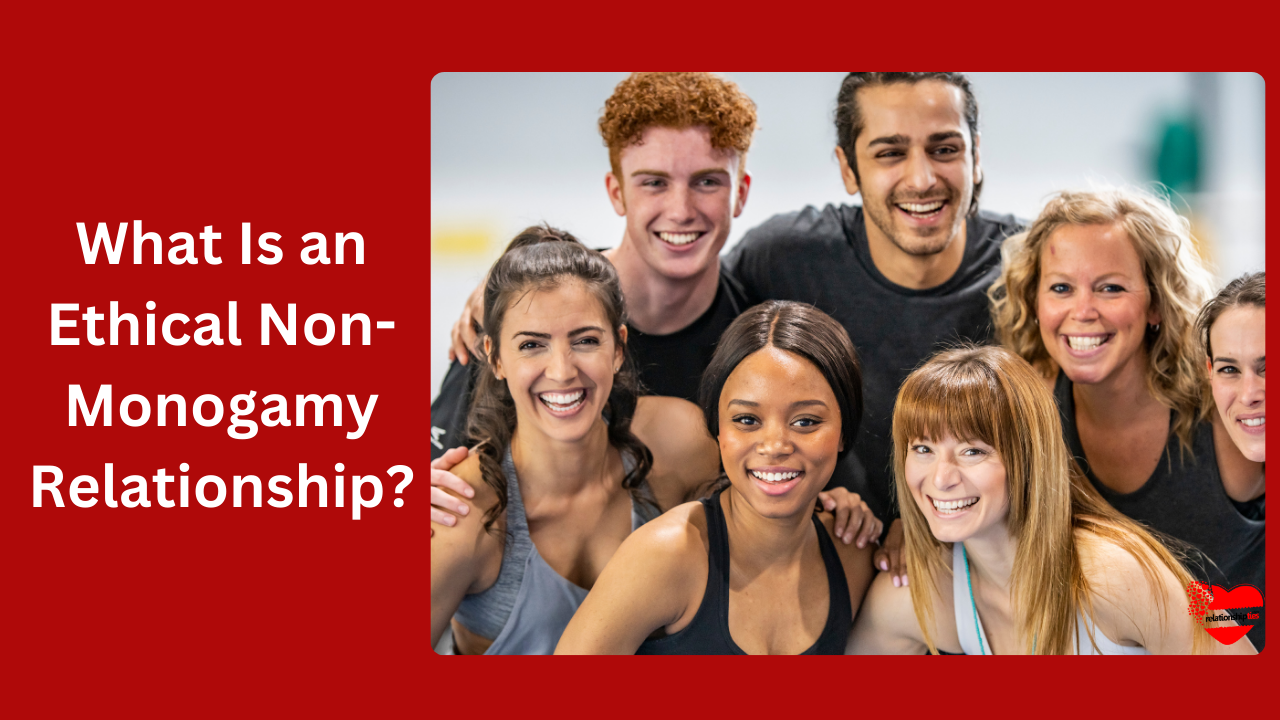ENM Relationship Meaning | What Is an Ethical Non-Monogamy Relationship?
In the Ethical Non-Monogamy (ENM) world, where relationships are as varied and colorful as a rainbow, commitment is non-existent.
It’s a realm that transcends the bounds of conventional love tales, providing a canvas on which numerous relationships, consent, and open communication depict intimacy.
Having several partners isn’t the only aspect of ENM; it’s a harmonious blend of open communication, respect, and trust.
Enter a world where people build relationships specific to their wants and desires, carefully negotiate boundaries, and love has no limits.
Read on to learn more about the ENM relationships world, the existing pleasures, and the challenges that come with it.
What is ethical non-monogamy?
The practice of having many consensual relationships with the knowledge and consent of all people involved is known as ethical non-monogamy.
While most people in the U.S. consider themselves monogamous, it has been estimated that over one-fifth of single Americans have engaged in consensual non-monogamous relationships (21.9%).
This method differs from conventional forms of adultery or cheating in that it places a higher priority on respect, communication, and honesty.
Proponents contend that moral non-monogamy preserves transparency while allowing people to explore their interests and honestly sustain satisfying relationships.
Consent is a fundamental component of ethical non-monogamy relationships. Establishing boundaries in a relationship, attending to one another’s emotional needs, and ensuring everyone feels respected and valued are all decisions that partners may make together.
Furthermore, by challenging the notion that romantic or sexual exclusivity is the only way to intimacy and fulfillment, ethical non-monogamy questions cultural norms.
This idea opens the door to more inclusive and courteous interpersonal dynamics by encouraging candid communication about personal preferences and boundaries.
Apart from advocating for consent-driven communication, ethical non-monogamy urges its followers to deconstruct possessive mindsets around relationships and welcome compersion, which is the expression used to express delight in a partner’s satisfaction with someone else.
This paradigm-shifting way of thinking might offer a feeling of release from fears originating from conventional monogamous frameworks.
Key features of ENM
Here are key features of ENM:
- Consent: All partners involved know and agree to the relationship structure. This is the fundamental principle that distinguishes ENM from infidelity.
- Open communication: ENM relationships require open and honest communication about expectations, boundaries, and feelings.
- Emotional intimacy: ENM relationships are not simply about physical gratification. They can involve deep emotional connections and commitment.
- Different forms: ENM encompasses various relationship structures, including polyamory, swinging, and open relationships.
- Diversity: ENM is practiced by people of all genders, sexual orientations, and backgrounds.
How does ethical non-monogamy differ from monogamous relationships?
Monogamy and ethical non-monogamy (ENM) are two relationship philosophies with different guiding ideas and behaviors. Below is a summary of their main distinctions:
Relationship Structure:
Monogamy is the commitment of two people to have only one romantic and sexual partner at a time. The basis of the partnership is this exclusivity.
Conversely, ENM includes a range of partnership arrangements in which partners agree to have several romantic and sexual partners. Some arrangements have clear expectations and boundaries, while others are more flexible and open-ended.
Consent and Interaction:
In Monogamy, there is a presumed unspoken understanding of exclusivity. Expectations and boundaries may not be discussed as often or explicitly.
Meanwhile, ENM demands the express agreement of all parties concerning the type of connection and any restrictions or boundaries on relationships with other people. Communicating feelings, expectations, and concerns openly and consistently is critical.
Closeness on an emotional level:
The main goal of monogamy is to develop a strong emotional bond with just one person. Meanwhile, ENM entails profound emotional connections with partners depending on the person and their particular relationship structure.
Motivations and Objectives
Monogamy is motivated by a relationship’s need for exclusivity, stability, and commitment.
Conversely, ENM is driven by some things, such as the drive for greater independence and self-determination, unconventional perspectives on partnerships, satisfying personal needs and wants, or the pursuit of various sensual and emotional encounters.
Stigma and Social Expectations
Monogamy is widely accepted and seen as the “norm” in many cultures. For ENM, people still have to deal with prejudice and stigma in some areas, which means navigating cultural norms and possible criticism.
Flexibility and Diversity:
Ethical non-monogamous relationships can take various forms, such as open relationships, polyamory, swinging, or relationship anarchy, allowing for diverse relationship structures and dynamics. Meanwhile, a Monogamous relationship is not flexible.
Cultural and Social Norms
Monogamy is widely accepted and practiced in many cultures as the default relationship model, emphasizing the bond between two individuals. However, ethical non-monogamous relationships have yet to be accepted.
Read Also: 25 Uncompromisable Non-Negotiables in Relationships You Should Know
Types Of Ethical Non-Monogamy?
Ethical non-monogamy (ENM) encompasses a diverse spectrum of relationship structures prioritizing informed consent, open communication, and respect for all involved partners. Here are some of the most common types:
Polyamory
This involves having multiple committed romantic relationships with the knowledge and consent of all partners.
Polyamorous relationships can be closed, meaning they have defined boundaries and limited partners, or open, where new connections are continuously explored.
Open Relationships
These are partnerships where partners agree to have romantic and/or sexual relationships outside of the primary relationship.
Open relationships can be structured or unstructured, with varying degrees of communication and involvement between partners about external relationships.
Relationship Anarchy
This approach rejects the traditional labels and structures of relationships, focusing instead on individual autonomy and the freedom to form emotional connections without societal expectations.
Solo Polyamory
This involves identifying as single while being open to multiple romantic and/or sexual relationships. Solo poly individuals prioritize their independence and self-sufficiency while enjoying fulfilling connections with others.
Swinging:
This typically involves couples engaging in sexual activity with other couples in a consensual and recreational setting, often to add variety and excitement to their primary relationship.
Hierarchal Non-Monogamy
This involves primary and secondary relationships, where a primary partner enjoys greater emotional commitment and investment than secondary partners.
Kitchen Table Polyamory:
This describes a polyamorous community where all partners know and interact with each other, fostering open communication and transparency amongst the entire network.
Polyfidelity
A closed group of individuals involved in a committed relationship with each other exclusively. It resembles monogamy in the sense that the group is closed, but it involves multiple partners instead of just two.
Compersion
This is the opposite of jealousy and refers to the joy and satisfaction experienced when a partner has positive experiences or relationships with others.
It’s important to remember that these are just a few examples, and ENM encompasses a vast array of individual expressions and arrangements.
Each relationship within ENM is unique and evolves based on the specific needs and desires of the individuals involved.
Read Also: Intellectual Relationships | Signs you are not Intellectually Compatible
Ethical Non-Monogamy vs. Cheating | What is the Difference?
Although cheating and ethical non-monogamy are sometimes mistakenly associated or misunderstood, their guiding ideals and effects on relationships are very different.
Honesty, mutual consent, and open communication are essential components of ethical non-monogamy amongst all partners.
It’s a deliberate decision considering everyone’s boundaries and feelings. Contrarily, infidelity in a committed relationship involves lying, betrayal, and a breach of trust.
The degree of openness and consent is a crucial distinction between ethical non-monogamy and cheating.
All partners in an ethical non-monogamous relationship are aware of one another’s presence and are capable of making well-informed judgments on their level of commitment.
On the other hand, deception entails concealment and frequently results in psychological distress for the person deceived.
Ultimately, the key distinction between ethical non-monogamy and cheating is whether or not one respects their partner(s) and their limits.
Regarding healthy relationships, open communication, trust, and understanding are encouraged in ethical non-monogamy, but these principles are undermined by cheating.
Why Do People Choose ENM Relationship?
Since ethical non-monogamy (ENM) offers a variety of dynamics and opportunities for satisfying relationships based on personal needs and preferences, people choose ENM for a variety of reasons:
Relationship Diversity:
With the permission of all parties involved, ENM permits people to experiment with various kinds of relationships, including romantic, emotional, and sexual ones. It provides a wider range of relationship experiences compared to conventional monogamy.
Personal Freedom and Self-Governance:
Personal freedom and liberty are valued highly by ENM. People have the freedom to mold their relationships in the way that best suits them, which enables them to express who they are in a relationship without having to follow conventional rules.
Emotional Satisfaction:
Several significant relationships might provide emotional contentment for some people. ENM offers opportunities to form varied and profound emotional connections with various partners.
Sincere Conversation and Trust:
ENM promotes candid and open communication between partners. Stronger trust and understanding are frequently the result of this emphasis on openness and transparency in relationships.
Exploration and Growth:
ENM is a popular tool for investigating personal development and self-discovery. It provides chances for education, the development of interpersonal skills, and the knowledge of diverse facets of oneself via various connections.
Tailored Relationship Frameworks:
People can design relationship structures with ENM that work for them. It provides flexibility and customization in several forms, such as multiple committed partnerships, non-hierarchical approaches, or other arrangements.
Questioning Social Norms:
Selecting ENM can be a means of challenging relational conventions in society. It critiques the notion that monogamy is the sole fulfilling or legitimate type of relationship.
Compatibility and mismatch:
Some may feel that their ideals or desires aren’t aligned with typical monogamous relationships. ENM offers a better option that satisfies their requirements for compatibility.
Support and Community:
People who practice ENM have vibrant communities and support systems. Participating in these groups can offer comprehension, direction, and a feeling of inclusion.
Individual Principles and Views:
Some people find that ENM more closely reflects their ideals, convictions, or philosophical perspectives on intimacy, love, and relationships.
Choosing Ethical Non-Monogamy is personal and shaped by personal experiences, beliefs, and aspirations. It provides a flexible and varied method of approaching relationships.
Read Also: How to Be an Adult in Relationships: A Guide to Healthy and Fulfilling Connections
Would a non-monogamous relationship work for you?
Gaining insight into one’s own needs, boundaries, and desires is essential when starting a non-monogamous relationship.
Negotiating the developing complications requires unshakeable trust, open and honest communication, and emotional intelligence.
It’s important to consider whether you’re comfortable sharing your partner with others and vice versa before choosing this kind of relationship. It also calls for healthily controlling any jealousy, insecurity, or possessiveness.
Relationships that are not monogamous can be liberated from social conventions but also require a deliberate strategy centered on respect, consent, and moral conduct.
This entails placing a high value on explicit agreements for sexual health procedures and encouraging ongoing dialogue about shifting emotions or wants.
Finding partners with similar ideals and perspectives on non-monogamy is also necessary, as is realizing that every relationship is unique and depends on the individuals involved.
In the end, determining if a non-monogamous relationship could benefit you requires valuing each person’s liberty and well-being and having a keen awareness of your needs.
It’s not just about diversity or physical closeness; rather, it’s about a chance to grow via introspection and a genuine acceptance of the complexity of relationships with others in all their manifestations.
How Can I Practice ENM?
Here are some steps you can take to practice ethical non-monogamy (ENM):
Self-reflection and exploration:
- Examine your motivations: Explore your reasons for wanting to practice ENM. Are you seeking more freedom, connection, or personal growth? Understanding your triggers can guide your approach and help you navigate challenges.
- Educate yourself: Read books, articles, and blogs about ENM to gain a deeper understanding of different relationship structures, communication strategies, and potential challenges.
- Identify your boundaries and expectations: Reflect on what you are comfortable with and what is not. Define your boundaries regarding emotional intimacy, sexual activities, communication, and involvement with other partners.
- Consider your emotional capacity: Assess your ability to manage emotions like jealousy and insecurity, common in ENM. Be honest with yourself about your needs and limitations.
Open communication and consent:
- Talk to your existing partner(s): Have open and honest conversations with your current partner(s) about your interest in ENM. Explain your motivations, boundaries, and expectations, and listen to their feelings and concerns.
- Seek consent from all partners: Ensure everyone fully understands and consents to the ENM structure. Explicit consent is crucial for ethical practice and building trust within relationships.
- Maintain open communication: Communicate regularly with all partners about your feelings, experiences, and concerns. Be transparent and honest about your relationships and activities outside the primary relationship.
- Respect individual needs and boundaries: Pay attention to the needs and boundaries of all partners. Be mindful of individual differences and respect each person’s desires and comfort levels.
Building a support network:
- Connect with ENM communities: Join online forums, groups, or local meetups to connect with others practicing ENM. Sharing experiences and learning from others can be helpful and supportive.
- Seek professional guidance: Consider working with a therapist or counselor specializing in ENM to receive personalized guidance and support in navigating relationship dynamics, communication challenges, and personal growth within the context of ENM.
- Prioritize self-care: Take care of your physical and mental well-being. Practice self-compassion, engage in enjoyable activities, and build a strong support network outside your relationships.
Read Also: 15 Ways to Spot Toxic Relationships
FAQs About ENM Relationship Meaning
Q1: What is the meaning of ENM relationship?
What are the different types of ethical non-monogamous relationships?
How do I know if ethical non-monogamy is right for me?
Is ethical non-monogamy the same as cheating?
Can ethical non-monogamous relationships be successful in the long term?
Conclusion
Ethical non-monogamy (ENM) allows people to participate in consensual, transparent, and honest partnerships and signifies a substantial shift from conventional relationship patterns.
ENM aims to question society’s norms and expectations around monogamy while fostering autonomy and agency for all people involved by placing a high value on communication, respect, and consent.
Diverse forms of intimacy and love must be valued as more individuals look into alternative relationship models.
We can promote a more accepting and understanding culture that values the variety of ways people choose to interact with one another by educating ourselves further on the ethical non-monogamy principles and fighting the stigmas attached to non-traditional relationships.
Related Articles
- What is a Transactional Relationship | Traits, Advantages and Dangers.
- 25 Uncompromisable Non-Negotiables in Relationships You Should Know
- Friends with Benefits Meaning in Relationship| Is it Right for Me
- 15 Ways to Spot Toxic Relationships
- How to Be an Adult in Relationships: A Guide to Healthy and Fulfilling Connections
- How To Build A Dynamic Relationship: Meaning and Their Types
- Intellectual Relationships | Signs you are not Intellectually Compatible






